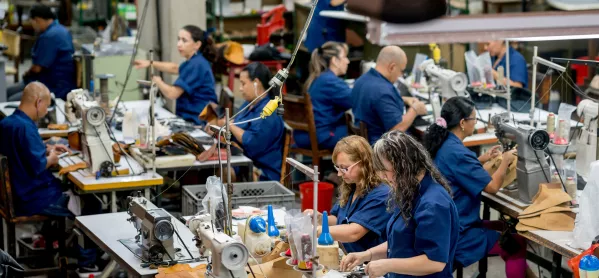- Home
- How factory work ‘pays more than supply teaching’
How factory work ‘pays more than supply teaching’

Supply teaching work has dried up to such an extent under Covid-19 that teachers are switching to other roles, including working in factories - where the pay can exceed what they were earning in schools, Tes has found.
Although many schools are facing staff shortages due to teachers having to self-isolate, the pandemic has also stretched school finances, putting supply teaching budgets under increased strain.
Schools are also said to be showing “caution” about having non-staff members on-site because of concerns about Covid-19 safety.
As a result, some supply teachers are struggling to find work; poll findings shared with Tes suggest that around half of supply teachers have yet to receive any offers of work so far this term.
This has forced some to find work in other industries, with a national body representing supply teaching agencies reporting “increasing numbers leaving the profession”.
Coronavirus: The impact on supply teachers
One supply teacher who has had to look for alternative work is Tim Holden, from East Yorkshire.
He told Tes: “With little supply work available at the start of this term, I was forced to take on night shifts in a factory to pay the mortgage or risk losing our home.
Read: Supply teachers fight for equality in pay
Coronavirus: Supply teachers unpaid due to ‘cash flow’
Read: ‘Supply teachers face greater insecurity’
“I was rather shocked to find that a full-time factory job actually pays more than many supply teachers earn annually*, especially when agencies are offering fully qualified teachers as little as £65 a day.”
Tes previously revealed how some supply teachers faced a “daily fight to get paid” under lockdown, when only a third of supply agencies were said to be using the furlough scheme.
“It wouldn’t surprise me if a significant number of supply teachers like myself have been forced to take on alternative work rather than risk having no income; especially after months of little or no financial support,” said Mr Holden.
‘Less work than usual’
Kevin Courtney, joint general secretary of the NEU teaching union, said it did appear that supply work was currently harder to come by.
“September is always a quieter month for supply work, but it appears there is less work than usual this year,” he added.
“That must be due to schools’ caution about visitors to the premises as well as to any concerns about funding.”
These funding pressures, leading to a lack of supply work, were partly driven by the cost of Covid safety measures, according to a senior source within the supply teaching sector, who did not wish to be named. Another factor was the need for schools to meet the full cost of the teacher pay award, the source said.
Mr Holden, who runs two Facebook groups for supply teachers, said “many members” had already been talking about leaving the profession over the past few months and some were now having to make that leap.
A Facebook poll that he carried out of more than 450 supply teachers revealed that half had yet to receive any offers of supply work so far this term.
He added: “I would estimate that about 10 per cent have already had to find alternative work and this figure is likely to increase further in coming months.”
‘Schools could close’
If too many supply teachers desert the profession, this could result in schools being forced to close as Covid cases rise, according to Sophie Wingfield, interim director of policy and campaigns at the REC (Recruitment and Employment Confederation).
She said: “While there are no exact figures showing how many supply teachers have left the industry since the pandemic began, REC members in the education sector have told us they are seeing increasing numbers leaving the profession.
“If a teacher or student tests positive for Covid-19, then they have to self-isolate, and we could see this happening more as case numbers increase. With fewer supply teachers available to cover these absences, schools could have to limit the number of classes they can teach or may even be forced to close completely.
She added: “This is just one more reason why it is essential for the government to protect the existing pool of supply teachers both financially and from Covid, through the test and trace system. This would help ensure there is no further exodus from the profession.”
A Department for Education spokesperson said its guidance outlined “a number of options if schools are facing a shortage of teachers”, including using staff more flexibly, recruiting permanent and short-term staff, and utilising trainees.
“Local authorities and trusts are also on hand to talk to schools about any concerns over staffing capacity,” the spokesperson added.
Regarding the funding concerns, the spokesperson said schools had “continued to receive their core funding throughout the pandemic, with this year marking the first year of a three-year increase to core funding - the biggest in a decade”.
*Mr Holden said he was earning £80 per shift in the factory, which amounts to £20,800 per annum (based on five shifts a week). But he said a supply teacher’s typical rate was £100 to £125 a day, with most doing two or three days a week, on average, which makes an annual salary of £14,250 (over 38 weeks).
*Tes’ parent company owns three teacher-supply agencies.
Keep reading for just £1 per month
You've reached your limit of free articles this month. Subscribe for £1 per month for three months and get:
- Unlimited access to all Tes magazine content
- Exclusive subscriber-only stories
- Award-winning email newsletters



